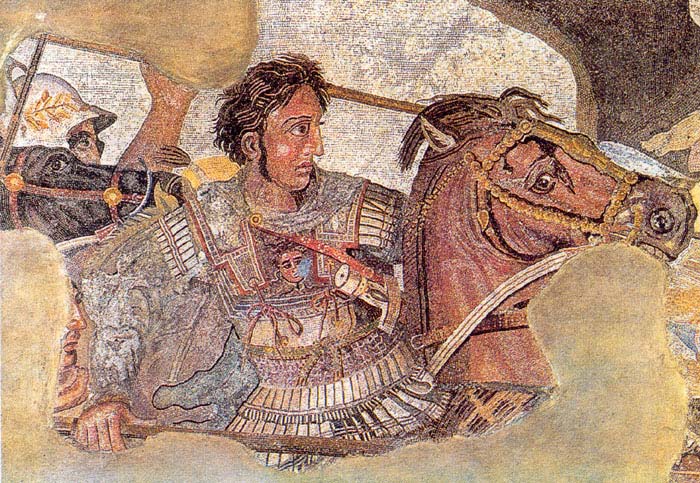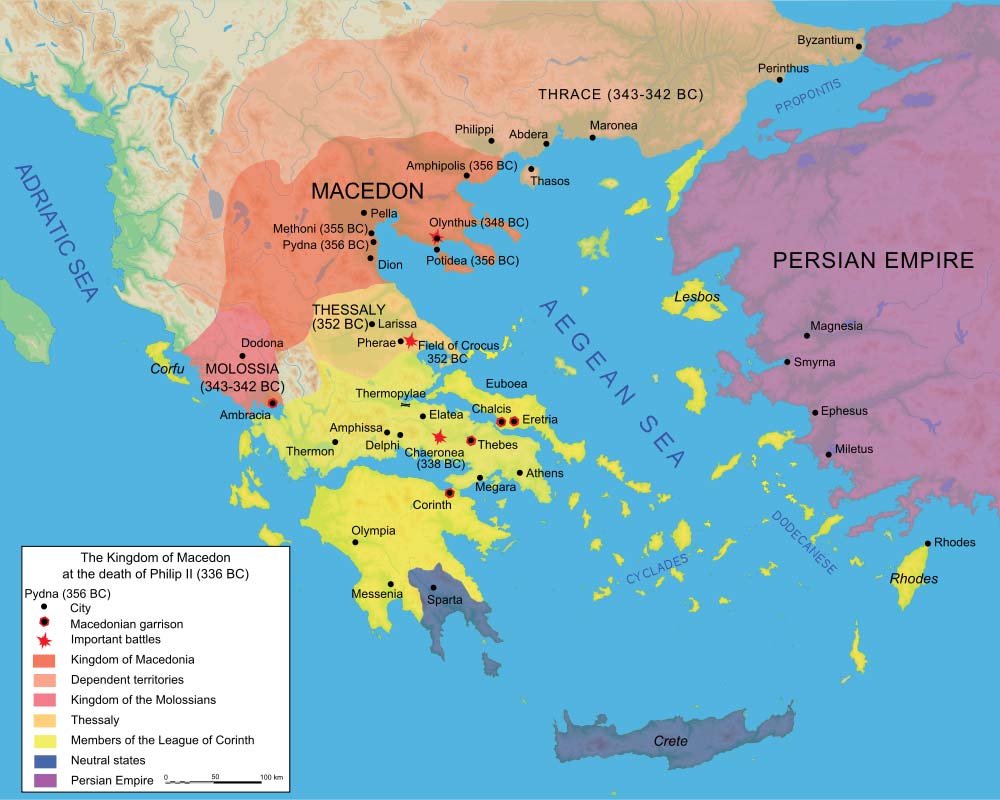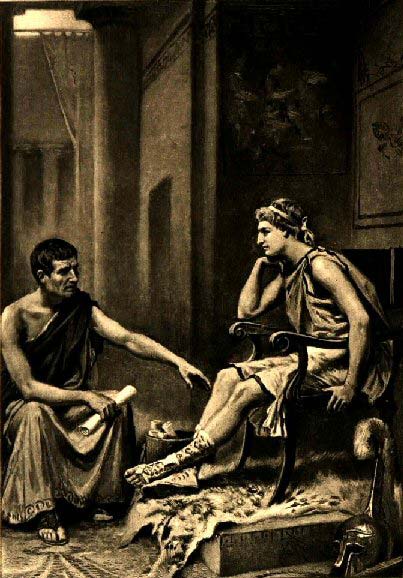| Alexander the Great | |
|---|---|
 |
|
| King of Macedonia | |
| In Power | 336–323 BC |
| Born | Alexander III of Macedon July 20 or 21, 356 BC Pella, Macedon |
| Died | June 10 or 11, 323 BC (at age 32) Babylon |
| Religion | Greek polytheism |
Alexander the Great is quite possibly one of the most well-known military leaders in history. Not only for what he accomplished and the army he led, but because of the short period of time he did this in, and his age when he undertook the conquest.
Leading his soldiers for nearly 13 years, the respect his soldiers had for him and his way of power show in the fact that in these years, only once did they refuse to follow him in a battle due to the complexity of the battle and the lack of preparation that they were going in with.
Alexander III (better known as the Great), was born in Pella, which is the ancient capital of Macedonia, in July of 356 B.C. Phillip II of Macedon was his father, and his mother was Olympias; Alexander’s depth and great deal of knowledge, which began at a young age, was in part due to the fact that he was taught by the great philosopher Aristotle, who is still today known as one of the greatest educators, philosophers, and one of the greatest minds, not only in ancient Greece, but also throughout the world for the work that he has done through history.
Family and Early Career
 Alexander’s father, Phillip II, was assassinated in 336 B.C. Alexander inherited the throne that his father had controlled, at a very young age. With this inheritance, he not only had a powerful militia and backing, but he also inherited a volatile kingdom that was enduring a period of unrest.
Alexander’s father, Phillip II, was assassinated in 336 B.C. Alexander inherited the throne that his father had controlled, at a very young age. With this inheritance, he not only had a powerful militia and backing, but he also inherited a volatile kingdom that was enduring a period of unrest.
Alexander quickly dealt with the enemies on his home territory, which helped to reassert the Macedonian power, and reassemble the nation as a powerful one in Greece, after it had lost its power and prestige over the years. Upon uniting his homeland, Alexander led a great conquest in an effort to take over the Persian Empire. He commanded a powerful militia along the way.
Persian Empire
Although he was a young leader, he had a very powerful militia, and a very powerful and united following. His vast level of intelligence and knowledge, not only in fighting but also in tactical experience, gave Alexander the much needed power to lead his army and to begin the takeover that he led in only a short period of time.
 Although the odds were overwhelmingly against him and his military backing, he led them through to various victories. Some of his earlier victories included those in many Persian territories (including Asia Minor, Syria, and Egypt). During this reign and these battles that his army engaged in, Alexander did not suffer one single loss, and his army only suffered low numbers of casualties, in comparison to opposing military powers they encountered.
Although the odds were overwhelmingly against him and his military backing, he led them through to various victories. Some of his earlier victories included those in many Persian territories (including Asia Minor, Syria, and Egypt). During this reign and these battles that his army engaged in, Alexander did not suffer one single loss, and his army only suffered low numbers of casualties, in comparison to opposing military powers they encountered.
Major Battle Victory & Rise in Leadership
Alexander’s greatest victory came at the Battle of Gaugamela, in 331, in the area that is today known as northern Iraq. The young king became known as a very powerful leader, military expert, leader of the Greeks, overlord of the Asia Minor area, and pharaoh of Egypt. He became known as the great king of Persia. He accomplished all of these feats and held all of these titles at the young age of 25.
Long Journey
During the next 8-year period, Alexander led his army over 11,000 miles. He founded over 70 cities along the journey and created the largest empire, stretching over an area that covered 3 continents and over 2 million square miles of land. He did this with his capacity as a king, politician, and great scholar. He proved to be a great commander and great explorer, leading his army and his people to become the most powerful military and nation.
Commerce and Trade
The lands west of Greece in the west, north of the Danube, far down south into Egypt, and stretching out as far east as Punjab (India), comprised a vast international network for trade and commerce. This was thanks to Alexander and the power he held in these regions, along with his scholarly intellect, to get all of these nations and people to cooperate and create a powerful center of trade and goods distribution.
The Greek language and culture connected all of these nations and the trade forum that took place. The king adopted many foreign customs; this allowed him to rule the millions of people and military personnel. It allowed him to effectively lead several different and distinct ethnic groups and people, all under one common rule.
Military Genius
Alexander was highly noted as a genius in his military attacks, tactical positioning, and his way of leading his militia to the right place and at the right time to execute a powerful assault against the nations they battled. He led by example and was always on the front lines, fighting alongside his men.
His belief that he was indestructible, however, meant that in many instances he was very reckless with his own life and the lives of the soldiers that fought with him. At times, this made him a volatile leader. Despite this, during his 13 years of reign and in leading his armies, only once did his men refuse to follow him into battle. This conveys that he possessed a great tactical mind. He was a great military leader that did not lose a single battle during his time in power.
Alexander did not die in battle but died of a fever (due to lack of proper medical attention and care during his lifetime) in June 323 B.C. He died in Babylon. His power and capability made him the leader that changed the nature of the ancient world, and was able to do this in a little less than 1 century. He is still today viewed as one of the greatest leaders, not only in military but also because of his vast intelligence in leading his nation.